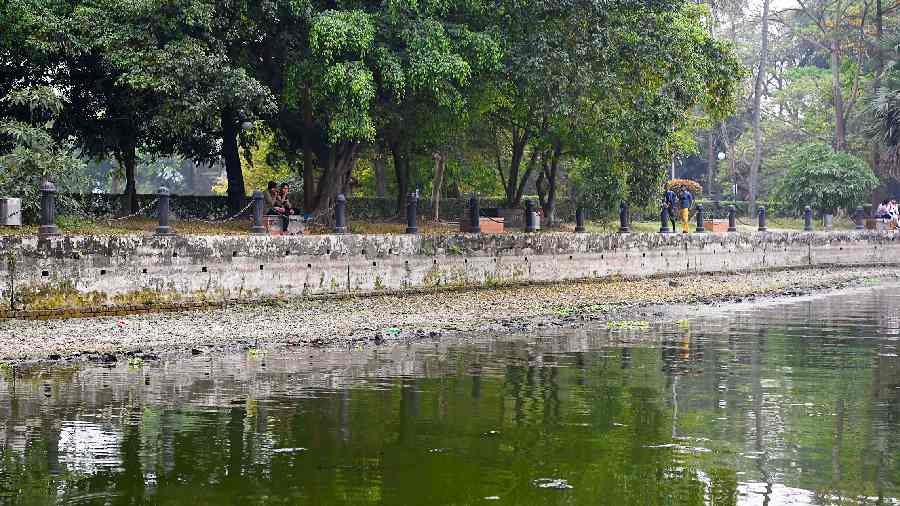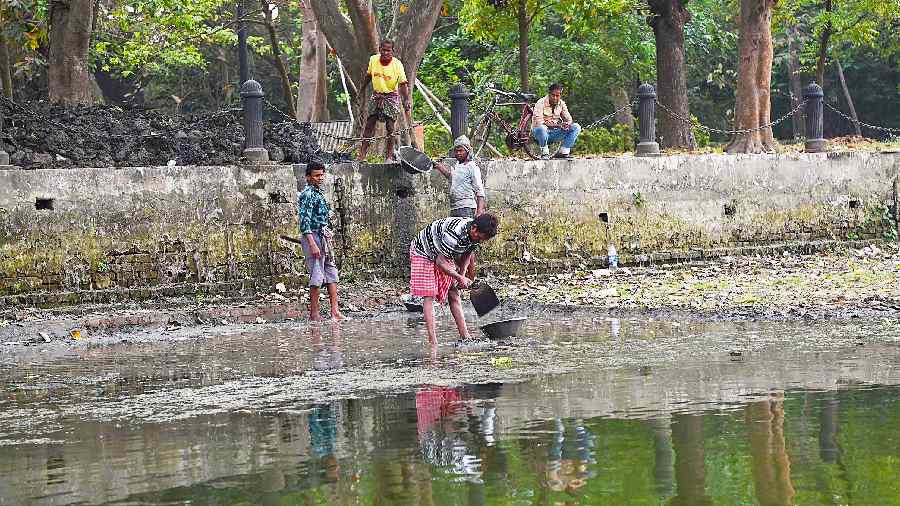The good news — Rabindra Sarobar will keep hosting rowing tournaments for now, despite the depleting water level.
The not-so-good news — the ecological balance of the lake needs an urgent audit, said environmental experts.
The drastic fall in the water level of the lake had cast a cloud of uncertainty on an upcoming national-level rowing tournament that the water body was supposed to host.
A meeting convened by the West Bengal Rowing Association on Tuesday decided to go ahead with the tournament.
The national sub-juniors is slated to be held between June 1 and 4.
“The sub-junior level tournaments need a 500m course. The water level has fallen alarmingly. But the problem is more acute towards the banks. We can still provide a 500m course between the island near the Buddha Temple and the Lake Club. The water level has dipped by around 4ft on an average. We are expecting a loss of another six inches in the coming days. But even then, hosting this tournament should not be a problem,” said Subhasish Dasgupta, president of the association.
The association had been considering tweaking the course by setting up a floating jetty. “But as of now, it is not needed,” said Dasgupta.
On Saturday, The Telegraph reported how the water level in the Sarobar had dipped at a rate that members of the rowing fraternity called “alarming and unprecedented”.
Several parts towards the banks have practically become inaccessible for rowing boats and motorised rescue boats for fear of getting stuck.
Kolkata Metropolitan Development Authority (KMDA), custodians of the Sarobar, has engaged men to dredge the lake.
The water loss has been attributed to a rain deficit in last year’s monsoon.
In the past, dead fish found floating on the surface have often indicated deteriorating health of the lake.
Environment experts cautioned against waiting for calamity to strike. They said the dip in the water level could affect the lake’s biodiversity.
“A detailed study is needed. The Sarobar is an ecological island in a concrete jungle. The health of the lake is of utmost importance. The depleting water level can have multiple effects. The level of dissolved oxygen needs to be checked. The pollution load goes up with decreasing water level. An inspection of the plankton is very important. Planktons are one of the crucial components of biodiversity. When other parameters change, planktons are also affected,” said Punarbasu Chaudhuri, associate professor of environmental science at the University of Calcutta.
“The KMDA should constitute a team of experts for biodiversity and ecosystem assessment. The Sarobar is a major urban biodiversity refugia. It needs regular assessment and monitoring,” said Parthiba Basu, professor of zoology at the University of Calcutta.
Seasonal change is always there. The water level goes down in ponds, lakes and canals in peak summer.
“In case of an aquatic ecosystem, the entire food chain is affected. But that effect is taken care of as part of a natural cycle. The seasonal changes, the reproductive lifecycle, everything is synchronised in a natural way. But when the change is out of order, it creates a big challenge. An abnormal drop in the water level is one such problem that goes beyond nature’s own readjustment process,” said Basu.
A KMDA official said periodic inspections are done to assess the condition of the Sarobar.
“We conduct regular checks. The oxygen level in the lake is steady. There is nothing to worry about. This (dip in the water level) is a seasonal issue,” said the official.

